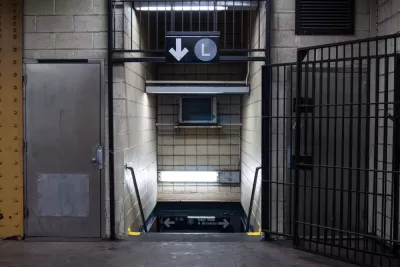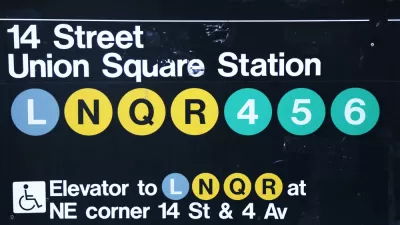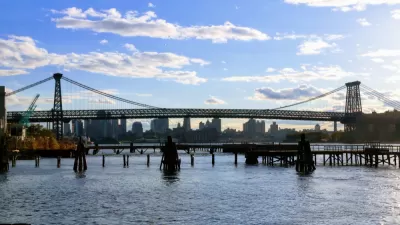Surprise, shocking news from New York City, as Governor Andrew Cuomo steps in at the 11th hour to change course on the highly anticipated (and dreaded) L Train closure scheduled to begin later this year.

"Gov. Andrew M. Cuomo announced on Thursday that the L train subway tunnel would not fully shut down in April as planned in what would have been one of the biggest transit disruptions in New York City’s recent history," report Emma G. Fitzimmons and Shane Goldmacher.
The L Train closure was scheduled to begin on April 27, and preparations to make up for the lost capacity were already well underway. "The Metropolitan Transportation Authority, which operates the subway, had said the closing was necessary to repair damage from Hurricane Sandy in 2012, when the tunnel between Manhattan and Brooklyn was inundated by floodwaters," according to Fitzsimmons and Goldmacher.
Enter Governor Andrew Cuomo, who hatched a new plan with the help of a panel of experts. Under the new plan, "workers would use a different design to repair the tunnel and some work could be done on nights and weekends," according to the article. "The new plan could be completed in 15 to 20 months and means that the L train’s rush hour schedule will remain the same. Trains would still run at night and one weekends but wait times would be longer."
The methods recommended in the new plan have been deployed in Europe, but never before in the United States.
More coverage of the news is available from the Wall Street Journal (paywall), New York Post, Curbed New York, Business Insider, and Bloomberg.
FULL STORY: Full Shutdown of L Train to Be Halted by Cuomo

Planetizen Federal Action Tracker
A weekly monitor of how Trump’s orders and actions are impacting planners and planning in America.

Maui's Vacation Rental Debate Turns Ugly
Verbal attacks, misinformation campaigns and fistfights plague a high-stakes debate to convert thousands of vacation rentals into long-term housing.

Restaurant Patios Were a Pandemic Win — Why Were They so Hard to Keep?
Social distancing requirements and changes in travel patterns prompted cities to pilot new uses for street and sidewalk space. Then it got complicated.

In California Battle of Housing vs. Environment, Housing Just Won
A new state law significantly limits the power of CEQA, an environmental review law that served as a powerful tool for blocking new development.

Boulder Eliminates Parking Minimums Citywide
Officials estimate the cost of building a single underground parking space at up to $100,000.

Orange County, Florida Adopts Largest US “Sprawl Repair” Code
The ‘Orange Code’ seeks to rectify decades of sprawl-inducing, car-oriented development.
Urban Design for Planners 1: Software Tools
This six-course series explores essential urban design concepts using open source software and equips planners with the tools they need to participate fully in the urban design process.
Planning for Universal Design
Learn the tools for implementing Universal Design in planning regulations.
Heyer Gruel & Associates PA
JM Goldson LLC
Custer County Colorado
City of Camden Redevelopment Agency
City of Astoria
Transportation Research & Education Center (TREC) at Portland State University
Jefferson Parish Government
Camden Redevelopment Agency
City of Claremont





























